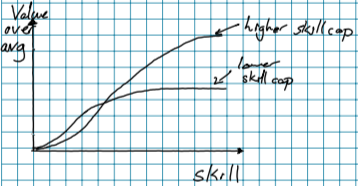EDIT: I'm only going to answer a few more questions, due to time constraints. I might eventually come back and answer more. I still appreciate getting replies with people's thoughts on things I've written.
I'm going to do an AMA on Tuesday next week (November 19th). Below I've written a brief description of what I'm doing at the moment. Ask any questions you like; I'll respond to as many as I can on Tuesday.
Although I'm eager to discuss MIRI-related things in this AMA, my replies will represent my own views rather than MIRI's, and as a rule I won't be running my answers by anyone else at MIRI. Think of it as a relatively candid and informal Q&A session, rather than anything polished or definitive.
----
I'm a researcher at MIRI. At MIRI I divide my time roughly equally between technical work and recruitment/outreach work.
On the recruitment/outreach side, I do things like the following:
- For the AI Risk for Computer Scientists workshops (which are slightly badly named; we accept some technical people who aren't computer scientists), I handle the intake of participants, and also teach classes and lead discussions on AI risk at the workshops.
- I do most of the technical interviewing for engineering roles at MIRI.
- I manage the AI Safety Retraining Program, in which MIRI gives grants to people to study ML for three months with the goal of making it easier for them to transition into working on AI safety.
- I sometimes do weird things like going on a Slate Star Codex roadtrip, where I led a group of EAs as we travelled along the East Coast going to Slate Star Codex meetups and visiting EA groups for five days.
On the technical side, I mostly work on some of our nondisclosed-by-default technical research; this involves thinking about various kinds of math and implementing things related to the math. Because the work isn't public, there are many questions about it that I can't answer. But this is my problem, not yours; feel free to ask whatever questions you like and I'll take responsibility for choosing to answer or not.
----
Here are some things I've been thinking about recently:
- I think that the field of AI safety is growing in an awkward way. Lots of people are trying to work on it, and many of these people have pretty different pictures of what the problem is and how we should try to work on it. How should we handle this? How should you try to work in a field when at least half the "experts" are going to think that your research direction is misguided?
- The AIRCS workshops that I'm involved with contain a variety of material which attempts to help participants think about the world more effectively. I have thoughts about what's useful and not useful about rationality training.
- I have various crazy ideas about EA outreach. I think the SSC roadtrip was good; I think some EAs who work at EA orgs should consider doing "residencies" in cities without much fulltime EA presence, where they mostly do their normal job but also talk to people.


I used to expect 80,000 Hours to tell me how to have an impactful career. Recently, I've started thinking it's basically my own personal responsibility to figure it out. I think this shift has made me much happier and much more likely to have an impactful career.
80,000 Hours targets the most professionally successful people in the world. That's probably the right idea for them - giving good career advice takes a lot of time and effort, and they can't help everyone, so they should focus on the people with the most career potential.
But, unfortunately for most EAs (myself included), the nine priority career paths recommended by 80,000 Hours are some of the most difficult and competitive careers in the world. If you’re among the 99% of people who are not Google programmer / top half of Oxford / Top 30 PhD-level talented, I’d guess you have slim-to-none odds of succeeding in any of them. The advice just isn't tailored for you.
So how can the vast majority of people have an impactful career? My best answer: A lot of independent thought and planning. Your own personal brainstorming and reading and asking around and exploring, not just following stock EA advice. 80,000 Hours won't be a gospel that'll give all the answers; the difficult job of finding impactful work falls to the individual.
I know that's pretty vague, much more an emotional mindset than a tactical plan, but I'm personally really happy I've started thinking this way. I feel less status anxiety about living up to 80,000 Hours's recommendations, and I'm thinking much more creatively and concretely about how to do impactful work.
More concretely, here's some ways you can do that:
Don't let the fact that Bill Gates saved a million lives keep you from saving one. If you put some hard work into it, you can make a hell of a difference to a whole lot of people.